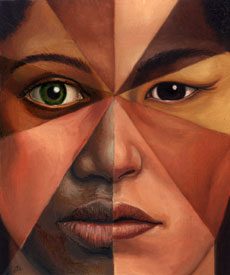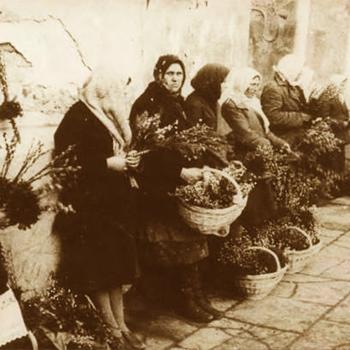 Some Thoughts About Race, Class, Unitarian Universalism and Zen Buddhist Sanghas
Some Thoughts About Race, Class, Unitarian Universalism and Zen Buddhist Sanghas
James Ishmael Ford
When I was thirteen my father went to prison.
It wasn’t the first time he saw the inside of a jail, but the first time I knew about it. It was just for a year. He’d been the manager of a liquor store. A friend of his said, “I just need to borrow the money ‘till Monday.” As I said, he went away for a year.
I took to bed. My mother fretted and finally sent me up to Oakland to live with my grandmother and auntie. They sent me to the local school. I was probably the only white kid there. At least I don’t recall seeing any other white kids. What I remember was being beaten up that first day. And the second. The third day I learned how to hide, to make myself invisible.
It was a hard year. The only thing that saved me from imprinting some pretty awful things was my grandmother. She was poor and not well educated and had no idea there might be alternatives to my going to that school. But, what she knew was that while there were mean kids and bad kids, their race had nothing to do with it. So, we prayed together. A lot. We prayed for my father who I was just learning to hate. We prayed for my mother who was having a hard time supporting herself and my brother. We prayed for each other. And we prayed for those kids at school.
Prayer is a good thing. Whatever I believed at the time, these days I don’t believe in a deity somewhere in the sky who takes messages and fixes things. But those prayers pried open spots in my heart, or, rather, took the holes already there, and pushed and prodded them bigger. Leonard Cohen sings to us how there is “a crack in everything, that’s how the light gets in.” Well, prayers push that crack bigger allowing more light.
I don’t claim I don’t carry wounds. But it’s been decades since I’ve seen a black person and felt afraid. And out of this, all of it, I find myself thinking about race and about class about what it means to be in the minority and what it means to not have resources. A lot. Over the years, I’ve considered these things a lot.
And now I am a Unitarian Universalist minister and a Zen Buddhist priest. I think a lot about race and class and the painful fact that my two spiritual are so heavily represented by people of European descent and who are mostly or at least mostly come from the middle classes. I’ve reflected and spoken with people, reflected and read into this, and I’ve reflected some more. And I’ve come to some conclusions, at least working hypotheses.
Each of us walks into a church or a Zen center for our own reasons. Why we stay or go are also going to be deeply marked by our own journey in life. But some things we share in greater or lesser degree.
One is that we’re all wounded. And the call of the Zen sangha in particular is toward healing, toward liberation. It is true for the liberal churches, as well, although this truth is sometimes lost in our identification with freedom and reluctance to share our liberal good news about hurt.
I have a strong opinion here. The good news to be found in these communities should be shared. We have ways that heal. We have genuine good news. We should be throwing our doors as wide open as possible, and inviting everyone who is hurt to come in and to find their way toward healing.
But why are we not?
I think we need to start by remember these are human gatherings. And some of our issues are just people issues. I like one kind of music. You like another. No fault. Although with music and with other things we might ask how can we maximize our inclusiveness while honoring our tastes.
Related to this is that even if we are genuinely looking for freedom or liberation that doesn’t mean our fall back position isn’t comfort. It’s easier to be with people who we think are more like us. Race is one of those “like us” things. Class is another.
I suspect this lies near the heart of the self-segregation that happens in many spiritual communities, why as Dr Martin Luther King Jr said, Sunday during worship is the most segregated hour of the week. Those who study churches suggest there may not even be such a thing as an integrated church. There is no stasis point. Churches are integrating or segregating. It’s all dynamic.
I want to be part of integrating communities.
There also seems to be a twenty percent rule in churches dealing with race. Whoever the dominant group is, they tend to be open to those of other groups, right up to around twenty percent. White churches want black members right up to about twenty percent. Then you hear the words “they’re trying to take over.” It appears to be true in black churches attracting white members. It appears to be true for other ethnic groupings and their willingness to welcome outsiders.
I want there to be no twenty percent barriers.
Perhaps you do, as well. Sadly, it isn’t going to be easy. If it were, well, I think it would long since have been done. But, if we see value in being with people we see as different in some ways we need to work at it, at being genuinely welcoming. And if it is going to happen anywhere, shouldn’t it be in our communities of faith, of healing, of liberation?
As I said we are all on our own paths. And we all need to read our hearts, and assess our true goals.
And, I’m mainly concerned with the issues of the majority white and majority middle class religious communities, specifically, as I said, UUs and Zen Buddhists. My people. Here is where I’ve taken my hurt, here is where I’ve found healing. And I’m grateful for the people I’ve found here. White and middle class as they are, or, more properly, largely white and middle class. I’ll come back to that in a bit. Now, there are a number of historic reasons for this to be so in these two communities in particular. So, I wouldn’t put a lot of blame on the fact that this is where we start.
The question is do we want to stop here? Or, is there something about what we’ve found that would be of help in healing and restoration for everyone, if only they were given the opportunity, the invitation? I want to reach out. I think most of us on these paths do, as well.
To open our communities to others is to notice how we’re defining self and other. Not a bad thing to reflect on for people who profess to be all about liberation. That said this looking can be hard. Being white and middle class can feel normal. White is without color. Middle class is just what people are. Unless you’re not.
The only people I’ve ever met who say they don’t see race are white people. I suspect there’s a message in that, and not a particularly sweet one. While I have no doubt race is a construct, the objective differences in peoples are too small to count for anything serious, nonetheless we make serious out of it. And the ones on the inside are the ones who are considered or consider themselves white. The problem with this is that it puts a lot of people on the outside. And outside is a big part of the problem.
Being white and middle class comes with many privileges. Being male adds to that list. People reading this shouldn’t feel this observation as condemnatory. It’s just something that is. (And should it be addressed? Yes. But, I’m focusing on a more specific issue here.) The problems arise when we think being white or middle class is somehow right, or normal, or that we got this (white and or middle class, and maybe even male) because we earned it. We may well have worked hard, many have, most have worked hard all their, our lives. But, don’t let anyone tell you the poor don’t work hard, too. Often much harder than anyone doing a job that earns a middle class income. Justice has very little to do with these things. If they did, schoolteachers would earn more than investment bankers.
And here’s a hard one if you’re white. Everyone who is white got a little head start. And all along the way there were little nods and legs up that didn’t go quite so quickly to those not considered white. This is true whether you ended up successful in life or not. White comes with privileges. I have no doubt that what differentiated me out from other poor people was my skin color. I got a little bit more attention. And sometimes that’s all it takes.
Similarly the single most important predictor of whether anyone is going to be middle class is that their parents were middle class.
That’s why it’s called privilege.
If we want to welcome people who do not fit the white and middle class description we need to acknowledge these issues. We don’t have to lead with them, we don’t have to talk about them in every conversation. But we have to know they’re there and they’re true, and they make people who don’t fall into the categories uncomfortable.
So, what to do? What to do?
Now, while I currently serve a church that is just a little more diverse than others generally are in our Association, not a whole lot more. And my Zen sangha fits the white middle class stereotype even more closely.
But not entirely.
And I think right after acknowledging there is a problem, and that problem at least so far as a white and middle class person has to do with it, has to do with the myopia of being white and middle class. So, it is critical to notice those who do not fit those bills and genuinely welcoming them in.
We all want to be seen.
Don’t say we’re all white, when there is someone sitting there who is not. Don’t assume we’re all middle class. We’re probably not.
See people.
That hardly seems too much to ask.
And, yes, there can be too much. I’ve been in UU churches where a black family walks in and they’re inundated with too much friendliness. Often, sadly, salted with ignorant if well meaning comments. Assumptions, for instance about class.
It seems the second rule of thumb is to pay attention without making too many assumptions.
Be friendly.
Care.
Be willing to make mistakes.
But make them from generosity.
Is this enough?
No.
But it is getting started…
And that is critical.
What we’re about is too important not to throw our everything into it.
Everything.
Leaving no one behind.
My prayer…












